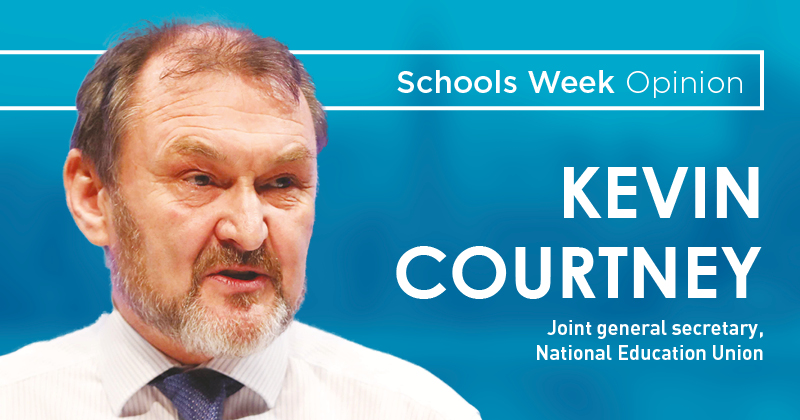Teacher workload is an ever-present crisis, but Steve Mastin argues that it stems from bad senior leadership, not the government
I love teaching. I get to discuss history with enthusiastic young minds, helping them to share my passion for the past. I also get to work alongside dedicated and inspiring colleagues, learning from them as I progress in my career. And what’s more, I get paid to do something I love.
Don’t get me wrong; some days are tougher than others.
Even if you work in a school where strict behaviour is maintained you will still have some difficult experiences. Any teacher will tell you that you invest so much emotionally and physically in your work. Despite what some of my friends think, my job does not begin at registration and end when the bell goes.
Good teachers put their all into a single lesson, even if they have taught for many years since the way in which pupils respond is different every time.

A good teacher will know that you read the class, looking into pupils’ eyes to check they understand and putting into place strategies for helping those who didn’t quite get it the first time around. You leave school having taught your lessons but also having done so much more. And this does not take into account those who go the extra mile and organise afterschool sporting fixtures, run clubs, lead trips, who rehearse a choir or volunteer to be the Duke of Edinburgh coordinator.
Last term, I was moved when I read about the plight of a recent graduate who was leaving the profession due to the pressure of an unreasonable workload. A bright, passionate 22-year-old said he was leaving to “restore his emotional and psychological wellbeing”. The problem was workload and everything he cited was the fault not of the DfE but his school’s culture. His story is sadly familiar.
Over the years, workload has increased in different ways.
Pupil learning styles was one of them: kinaesthetic, visual and aural learners need to be catered for in lesson planning. Personal, thinking and learning skills (PLTS) had to be mapped across the curriculum with evidence that pupils were meeting them.
I sat through one staff meeting about ‘thinking hats’. Most of us were thinking about how we could have used that one hour to mark books
I sat through one staff meeting about De Bono’s ‘thinking hats’, encouraging us to try to build them into our lessons. Most of us were thinking about how we could have used that one hour to mark books or plan lessons.
Many teachers have had to divide up national curriculum levels, against the advice of Ofsted and the DfE, both horizontally and vertically, so they can mark individual pieces of work in year 7 to show “progress”, differentiating lessons in six different ways to “engage” pupils.
The latest workload burden for many is dialogic marking, or triple marking, in which the teacher writes a comment on childrens’ work, and pupils then respond in green pen, redrafting their work.
The teacher is then obliged to look at again, thus taking time away from teaching.
No example I cited has ever been required by Ofsted or the DfE. The buck stops with schools when it comes to creating a culture of work for teachers. Many leaders are under considerable pressure to raise standards and, at times, have unintentionally increased the burden on their already diligent teachers. They need to have the confidence to trust their professional judgment and not add to teachers’ workload.
Can anything be stripped back to the basics of good teaching? Why are some teachers spending an hour creating a PowerPoint with animations? Is the whole-school marking policy part of the problem? Are those additional meetings useful? Is the reporting system onerous? If a new idea is implemented, have leaders been honest with staff about the additional workload?
Teacher workload is the responsibility of schools. School leaders can add to it or reduce it. The schools minister, Nick Gibb, categorically stated that triple marking should not be used.
There is a serious workload crisis in some schools and it is not the fault of the DfE. The next time your workload is added to, ask where this has come from.
Steve Mastin is chairman of the Conservative Education Society







I left teaching after twenty years burnt out. That was two decades ago. And I was burnt out not because senior management imposed daft teaching ideas (we were left to decide how to teach) but because of constant changes in exam syllabuses and marking schemes. I taught GCSE Business and Information Studies, GCSE English and English Literature. The syllabuses for all of these changed rapidly and coursework marking schemes with them.
Coursework has gone but secondary teachers have been hit even harder with massive changes to GCSE imposed with no trials or evaluation and little time. And then there’s EBacc, changes to A/S levels and schools being judged on how many pupils go to uni or get ‘facilitating’ subjects.
Primary teachers, too, have to cope with a new curriculum and an excessive emphasis on test results.
Over all this, successive governments have eroded teacher professionalism and imposed their own views on how teachers should teach. And it isn’t just a Tory problem. The late Ted Wragg castigated Tony Zoffis (aka Tony’s Office in the shape of Andrew Adonis) and Sven Turge (Stephen Twigg) for interfering in schools.
See ‘Education, Education, Education: the Best Bits of Ted Wragg’ for his excoriating criticism.
Correction: that should have read I left ‘in part because of constant changes in exam syllabuses and marking schemes’. Nevertheless, the changes paid a considerable part in my decision to leave.
“Teacher workload is the responsibility of schools.”
No. Teacher workload is the responsibility of the people who decide policy: the Government, which currently is a Tory one. Schools *implement* policy.
This article reads like another recent Schools Week piece – on social mobility – also written by a Tory and also calling for schools to ‘take responsibility’.
So, again: Why won’t Tories take responsibility for public services their election victory means they now control? Anyone would think they were trying to foist blame for any deterioration in public service provision or working conditions on public service professionals and providers.
So so predictable. Same old Conservative approach of divide and rule. It is a constant modus operandi – hard working families v those who can be portrayed as the “undeserving poor”; public sector workers v private sector workers when it comes to diminishing pensions for all; and now uncaring senior leaders v hard working teachers to divert the blame from their abject political management of education reform and finances. At sixty the one thing I have learnt is that this Tory tactic is their default position when things are awry because of their own inept policy management.